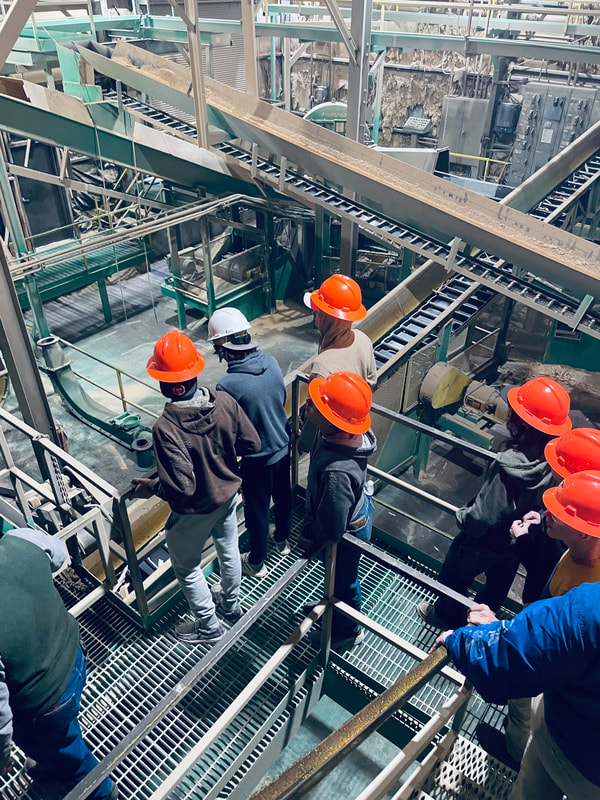Nov. 1 - Nov. 5, 2023
Drummond’s shop class taught by Mr. Bowey tours the Sun Mountain Lumber Mill with Forester, Sean Steinebach. Photos by Amelia Wood
Granite County students are benefiting from diverse educational experiences
By Amelia Wood
Following the recent agricultural education day at Drummond schools, classes from both Drummond and Philipsburg as well as Deer Lodge and Anaconda were invited to participate in an interactive timber harvesting and forest products industries field trip.
Sun Mountain Lumber and the Department of Natural Resources (DNRC), in collaboration with the Montana Timber Legacy Foundation and the Montana Logging Association, hosted the event to promote and educate students on Montana’s forestry products and the people that produce them.
Outreach Forester, Sean Steinebach, of Sun Mountain Lumber, said, “we have been running this field trip for fifteen years now and my favorite part is that, as an industry, we can take these students out to a logging site and watch a forest from standing trees, to being thinned—watching the logging process, the felling, the skidding, the processing—and then we can follow a log truck and watch it hit the mill. And from there, we can watch the entire production process from the raw material to the finished project.”
“What other students get the opportunity to watch a start to finish process like that?” said Steinebach.
In the past, Sun Mountain Lumber has hosted shop classes, biology, and advanced biology classes, as well as business classes. “This type of industry is extremely important for forest health and fuel management, as well as local jobs,” said Steinebach. “This industry is right in these kids’ back yard, and its important for them to recognize what we are and what we do.”
Steinbach said the presentations usually focus on ecosystem and forest health, especially after the mountain pine beetle devastation. But they also try to highlight the economic benefits of the industry. “Between our loggers and staff here, this facility employs about 200 people and provides jobs for those in Powell, Granite, Anaconda-Deer Lodge and Butte-Silver Bow counties.”
“We are a heavy influence economically in this area,” noted Steinbach.
Drummond’s shop and industrial arts teacher, Caleb Bowey, also emphasized that “the logging industry in this state is vital…and for students wanting to stay in the area after graduation, this industry can provide a lot of opportunities.
Currently, Bowey’s shop students are working on cornhole boards using 2x6s, which they were able to observe being produced while at the mill in Deer Lodge.
Bowey said he appreciates educational experiences like this and the recent Ag-day because, “they help students redefine what success might look like for them.” Bowey continued that, “although college is important, learning opportunities like this help give students an image of success that might include college but isn’t dependent on college.”
“In all of these field trips there is something students might be able to learn more about,” said Bowey. In this way, these field trips can act as a jumping off point for many different interests. Bowey emphasized that students should be exposed to these diverse learning experiences in order to “see what else is out there,” and then be equipped to pursue their interests.
Want to read the full story?
Click SUBSCRIBE at the top of this page.
Warriors wear down Titans
By Larry Hull
The Arlee Warriors ended the season for the Flint Creek Titans last Saturday on their home turf with a final score of 36-16. It was the first round of the Western Divisional Playoffs.
The Warriors deferred to the third period after winning the coin toss. The Titans, behind the running of signal caller Logan Hauptman, took the ball to the 36 of the Warriors. Hauptman threw a pass that found the hands of Trey Phillips that was good enough for the TD. Hauptman added the necessary punch to get in for the PAT.
The ensuing Titans’ kick-off had the Warriors at their own 20. A series of runs by Jace Arca put the home team at the visitors’ 1-yard line. Arca went in from here. Kendall O’Neill connected with Jake Knoll which resulted in the PAT.
The Titans then drove the ball to the 1 near the end of the opening period. Hauptman ran the ball in, and after Austin Knoeller added the PAT, the Titans went into the second period 16-8.
The second period saw the Warriors take the ball to the 22-yard line of the Titans. O’Neill hit Arca with an aerial for the TD. The Titans’ defense prevented the PAT.
The Titans mounted a drive that took them to the 15 of the Warriors. A holding call sent them back 10 yards, and they then turned the ball over on downs.
Neither the Titans nor their hosts were able to put any more points on the board, and the Warriors went into the half with a 16-14 lead.
The Warriors took the kick-off to begin the third period but were stopped by the Titans’ defensive unit.
However, the Titans were unable to get into the oppositions’ end zone.
Continued on page 3
Want to read the full story?
Click SUBSCRIBE at the top of this page.
Back in time with Loraine Bentz Domine: The outcome of booze versus the Johnson brothers
By Loraine Bentz Domine
On December 22, 1899, The Philipsburg Mail carried the ghastly story of the Johnson brothers’ quarrel. Apparently the three brothers, originally from Finland, had lived in the Antelope area about four miles west of Philipsburg for several years. They made a living by cutting timber into railroad ties and chopping cordwood.
“About 4 o’clock Wednesday morning, John Johnson, a Finlander, accompanied by his brother Herman appeared at the sheriff’s office and informed Sheriff Metcalf that he had shot and killed his brother Jacob and had come to give himself up. …Johnson informed the sheriff that the brother Jacob had been to town Tuesday and returned to camp late very intoxicated and with a bad temper. He swore he would kill John and arming himself with a broadaxe, proceeded to chop his way into the cabin. John told him, if he would lay down the axe and come into bed everything would be all right, but if he did not let up with the axe, he would shoot. Jacob continued to chop and was making good headway when John got the rifle and shot through the door.
The chopping ceased and when John and Herman opened the door to investigate they found their brother laying there, mortally wounded. They carried him inside and laid him on the bed where he soon expired.
After hearing the story, Sheriff Metcalf locked John Johnson up, and in company with George W. Opp drove to the scene of the tragedy, where the dead man was found, as told by the brother. Another Finlander was found asleep in the cabin, and on being awakened informed the sheriff that he knew of no trouble and had heard no shooting. He did not know that a man was dead in the cabin or that anything out of the ordinary had taken place during the night.
A coroner’s jury, composed of J.D. Hartwell, F.C. Walker, Frank Freschlag, Wm. Clawson, Archie McDonald and G. W. Opp visited the camp and inspected the premises….
It was found that the ball had entered the body on the right side of the abdomen and came out in the back near the left kidney.”
John Johnson was about thirty years old, and his brother was two years his senior. The Mail learned from John that he and his brother quarreled frequently due to Jacob’s temper when he drank. Jacob was the teamster and brought the product to market while the other two brothers did the chopping.
John’s trial was set for March 12, 1900, at which time he was tried for the killing of his brother. Both the Johnson brothers and many of the other witnesses spoke very poor English and so most of the testimony was given through an interpreter. Many people were called before a jury could be convened and so after three days the short trial began, and a verdict was returned after one hour of deliberation. “The courtroom was packed when the jury returned with the verdict and when it was known that John Johnson was to go free there was joy among the Finlanders, who all seemed to favor John Johnson…the jury evidently took the view that the defendant had acted in self-defense when he fired the fatal shot that took the life of his brother.”
Loraine Bentz Domine is a member of the Granite County Historical Society
Want to read the full story?
Click SUBSCRIBE at the top of this page.
Granite County students are benefiting from diverse educational experiences
By Amelia Wood
Following the recent agricultural education day at Drummond schools, classes from both Drummond and Philipsburg as well as Deer Lodge and Anaconda were invited to participate in an interactive timber harvesting and forest products industries field trip.
Sun Mountain Lumber and the Department of Natural Resources (DNRC), in collaboration with the Montana Timber Legacy Foundation and the Montana Logging Association, hosted the event to promote and educate students on Montana’s forestry products and the people that produce them.
Outreach Forester, Sean Steinebach, of Sun Mountain Lumber, said, “we have been running this field trip for fifteen years now and my favorite part is that, as an industry, we can take these students out to a logging site and watch a forest from standing trees, to being thinned—watching the logging process, the felling, the skidding, the processing—and then we can follow a log truck and watch it hit the mill. And from there, we can watch the entire production process from the raw material to the finished project.”
“What other students get the opportunity to watch a start to finish process like that?” said Steinebach.
In the past, Sun Mountain Lumber has hosted shop classes, biology, and advanced biology classes, as well as business classes. “This type of industry is extremely important for forest health and fuel management, as well as local jobs,” said Steinebach. “This industry is right in these kids’ back yard, and its important for them to recognize what we are and what we do.”
Steinbach said the presentations usually focus on ecosystem and forest health, especially after the mountain pine beetle devastation. But they also try to highlight the economic benefits of the industry. “Between our loggers and staff here, this facility employs about 200 people and provides jobs for those in Powell, Granite, Anaconda-Deer Lodge and Butte-Silver Bow counties.”
“We are a heavy influence economically in this area,” noted Steinbach.
Drummond’s shop and industrial arts teacher, Caleb Bowey, also emphasized that “the logging industry in this state is vital…and for students wanting to stay in the area after graduation, this industry can provide a lot of opportunities.
Currently, Bowey’s shop students are working on cornhole boards using 2x6s, which they were able to observe being produced while at the mill in Deer Lodge.
Bowey said he appreciates educational experiences like this and the recent Ag-day because, “they help students redefine what success might look like for them.” Bowey continued that, “although college is important, learning opportunities like this help give students an image of success that might include college but isn’t dependent on college.”
“In all of these field trips there is something students might be able to learn more about,” said Bowey. In this way, these field trips can act as a jumping off point for many different interests. Bowey emphasized that students should be exposed to these diverse learning experiences in order to “see what else is out there,” and then be equipped to pursue their interests.
Want to read the full story?
Click SUBSCRIBE at the top of this page.
Warriors wear down Titans
By Larry Hull
The Arlee Warriors ended the season for the Flint Creek Titans last Saturday on their home turf with a final score of 36-16. It was the first round of the Western Divisional Playoffs.
The Warriors deferred to the third period after winning the coin toss. The Titans, behind the running of signal caller Logan Hauptman, took the ball to the 36 of the Warriors. Hauptman threw a pass that found the hands of Trey Phillips that was good enough for the TD. Hauptman added the necessary punch to get in for the PAT.
The ensuing Titans’ kick-off had the Warriors at their own 20. A series of runs by Jace Arca put the home team at the visitors’ 1-yard line. Arca went in from here. Kendall O’Neill connected with Jake Knoll which resulted in the PAT.
The Titans then drove the ball to the 1 near the end of the opening period. Hauptman ran the ball in, and after Austin Knoeller added the PAT, the Titans went into the second period 16-8.
The second period saw the Warriors take the ball to the 22-yard line of the Titans. O’Neill hit Arca with an aerial for the TD. The Titans’ defense prevented the PAT.
The Titans mounted a drive that took them to the 15 of the Warriors. A holding call sent them back 10 yards, and they then turned the ball over on downs.
Neither the Titans nor their hosts were able to put any more points on the board, and the Warriors went into the half with a 16-14 lead.
The Warriors took the kick-off to begin the third period but were stopped by the Titans’ defensive unit.
However, the Titans were unable to get into the oppositions’ end zone.
Continued on page 3
Want to read the full story?
Click SUBSCRIBE at the top of this page.
Back in time with Loraine Bentz Domine: The outcome of booze versus the Johnson brothers
By Loraine Bentz Domine
On December 22, 1899, The Philipsburg Mail carried the ghastly story of the Johnson brothers’ quarrel. Apparently the three brothers, originally from Finland, had lived in the Antelope area about four miles west of Philipsburg for several years. They made a living by cutting timber into railroad ties and chopping cordwood.
“About 4 o’clock Wednesday morning, John Johnson, a Finlander, accompanied by his brother Herman appeared at the sheriff’s office and informed Sheriff Metcalf that he had shot and killed his brother Jacob and had come to give himself up. …Johnson informed the sheriff that the brother Jacob had been to town Tuesday and returned to camp late very intoxicated and with a bad temper. He swore he would kill John and arming himself with a broadaxe, proceeded to chop his way into the cabin. John told him, if he would lay down the axe and come into bed everything would be all right, but if he did not let up with the axe, he would shoot. Jacob continued to chop and was making good headway when John got the rifle and shot through the door.
The chopping ceased and when John and Herman opened the door to investigate they found their brother laying there, mortally wounded. They carried him inside and laid him on the bed where he soon expired.
After hearing the story, Sheriff Metcalf locked John Johnson up, and in company with George W. Opp drove to the scene of the tragedy, where the dead man was found, as told by the brother. Another Finlander was found asleep in the cabin, and on being awakened informed the sheriff that he knew of no trouble and had heard no shooting. He did not know that a man was dead in the cabin or that anything out of the ordinary had taken place during the night.
A coroner’s jury, composed of J.D. Hartwell, F.C. Walker, Frank Freschlag, Wm. Clawson, Archie McDonald and G. W. Opp visited the camp and inspected the premises….
It was found that the ball had entered the body on the right side of the abdomen and came out in the back near the left kidney.”
John Johnson was about thirty years old, and his brother was two years his senior. The Mail learned from John that he and his brother quarreled frequently due to Jacob’s temper when he drank. Jacob was the teamster and brought the product to market while the other two brothers did the chopping.
John’s trial was set for March 12, 1900, at which time he was tried for the killing of his brother. Both the Johnson brothers and many of the other witnesses spoke very poor English and so most of the testimony was given through an interpreter. Many people were called before a jury could be convened and so after three days the short trial began, and a verdict was returned after one hour of deliberation. “The courtroom was packed when the jury returned with the verdict and when it was known that John Johnson was to go free there was joy among the Finlanders, who all seemed to favor John Johnson…the jury evidently took the view that the defendant had acted in self-defense when he fired the fatal shot that took the life of his brother.”
Loraine Bentz Domine is a member of the Granite County Historical Society
Want to read the full story?
Click SUBSCRIBE at the top of this page.

News tips, submissions, letters to the editor: [email protected]
Circulation: [email protected]Billing: [email protected]
Advertising: [email protected]
Circulation: [email protected]Billing: [email protected]
Advertising: [email protected]
Times Change
But you can still re-live our past with the Philipsburg Mail’s
searchable and ever growing list of available archives:
1908 • 1911 • 1932 • 1935 • 1936 • 1938 • 1939 • 2009 to Present
searchable and ever growing list of available archives:
1908 • 1911 • 1932 • 1935 • 1936 • 1938 • 1939 • 2009 to Present


